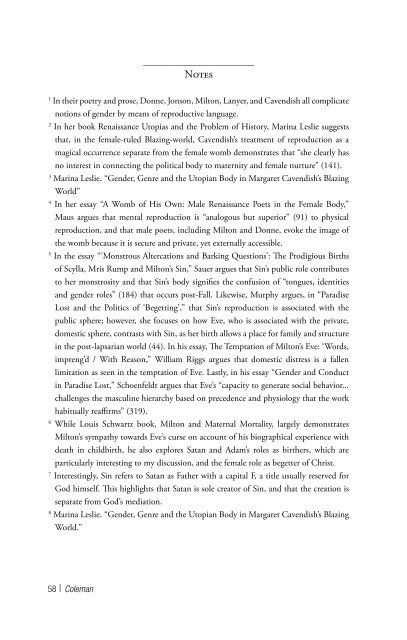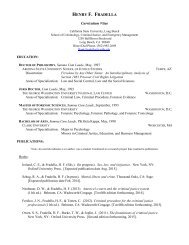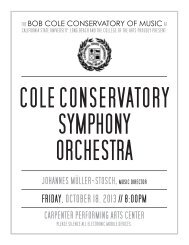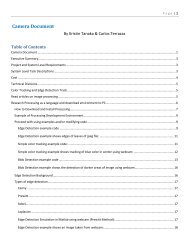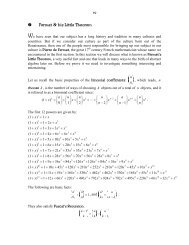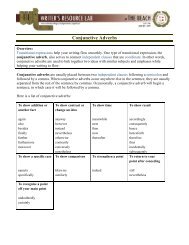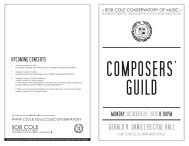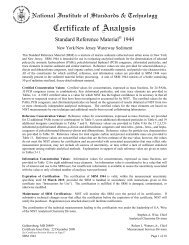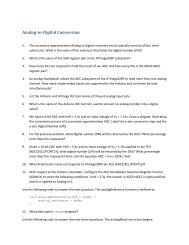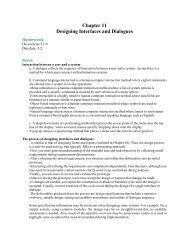Untitled - California State University, Long Beach
Untitled - California State University, Long Beach
Untitled - California State University, Long Beach
Create successful ePaper yourself
Turn your PDF publications into a flip-book with our unique Google optimized e-Paper software.
_________________________<br />
Notes<br />
_________________________<br />
Works Cited<br />
1<br />
In their poetry and prose, Donne, Jonson, Milton, Lanyer, and Cavendish all complicate<br />
notions of gender by means of reproductive language.<br />
2<br />
In her book Renaissance Utopias and the Problem of History, Marina Leslie suggests<br />
that, in the female-ruled Blazing-world, Cavendish’s treatment of reproduction as a<br />
magical occurrence separate from the female womb demonstrates that “she clearly has<br />
no interest in connecting the political body to maternity and female nurture” (141).<br />
3<br />
Marina Leslie. “Gender, Genre and the Utopian Body in Margaret Cavendish’s Blazing<br />
World”<br />
4<br />
In her essay “A Womb of His Own: Male Renaissance Poets in the Female Body,”<br />
Maus argues that mental reproduction is “analogous but superior” (91) to physical<br />
reproduction, and that male poets, including Milton and Donne, evoke the image of<br />
the womb because it is secure and private, yet externally accessible.<br />
5<br />
In the essay “’Monstrous Altercations and Barking Questions’: The Prodigious Births<br />
of Scylla, Mris Rump and Milton’s Sin,” Sauer argues that Sin’s public role contributes<br />
to her monstrosity and that Sin’s body signifies the confusion of “tongues, identities<br />
and gender roles” (184) that occurs post-Fall. Likewise, Murphy argues, in “Paradise<br />
Lost and the Politics of ‘Begetting’,” that Sin’s reproduction is associated with the<br />
public sphere; however, she focuses on how Eve, who is associated with the private,<br />
domestic sphere, contrasts with Sin, as her birth allows a place for family and structure<br />
in the post-lapsarian world (44). In his essay, The Temptation of Milton’s Eve: ‘Words,<br />
impreng’d / With Reason,” William Riggs argues that domestic distress is a fallen<br />
limitation as seen in the temptation of Eve. Lastly, in his essay “Gender and Conduct<br />
in Paradise Lost,” Schoenfeldt argues that Eve’s “capacity to generate social behavior...<br />
challenges the masculine hierarchy based on precedence and physiology that the work<br />
habitually reaffirms” (319).<br />
6<br />
While Louis Schwartz book, Milton and Maternal Mortality, largely demonstrates<br />
Milton’s sympathy towards Eve’s curse on account of his biographical experience with<br />
death in childbirth, he also explores Satan and Adam’s roles as birthers, which are<br />
particularly interesting to my discussion, and the female role as begetter of Christ.<br />
7<br />
Interestingly, Sin refers to Satan as Father with a capital F, a title usually reserved for<br />
God himself. This highlights that Satan is sole creator of Sin, and that the creation is<br />
separate from God’s mediation.<br />
8<br />
Marina Leslie. “Gender, Genre and the Utopian Body in Margaret Cavendish’s Blazing<br />
Cavendish, Margaret. “The Description of a New World, Called The Blazing World.”<br />
Paper Bodies. Ed. Sylvia Bowerbank and Sara Mendelson. Ontario, Canada:<br />
Broadview Press, Ltd, 2000. 151-251. Print.<br />
Leslie, Marina. “Gender, Genre and the Utopian Body in Margaret Cavendish’s Blazing<br />
World.” Utopian Studies 7.1 (1996): 6-24. JSTOR. Web. 24 November 2011.<br />
--- Renaissance Utopias and the Problem of History. Ithaca, NY: Cornell UP, 1998. Print.<br />
Maus, Katherine Eisaman. “A Womb of His Own: Male Renaissance Poets in the<br />
Female Body.” Printing and Parenting in Early Modern England. Ed. Douglas A.<br />
Brooks. Burlington, VT: Ashgate, 2005. 89-107. Print.<br />
Milton, John. Paradise Lost. Ed. Gordon Teskey. NY: W.W. Norton & Company, 2005.<br />
Print.<br />
Murphy, Erin. “Paradise Lost and the Politics of ‘Begetting’.” Milton Quarterly 45.1<br />
(2011): 25-49. MLA International Bibliography. Web. 6 November 2011.<br />
Riggs, William W. G. “The Temptation of Milton’s Eve: ‘Words, impreng’d / With<br />
Reason’.” The Journal of English and Germanic Philology 94.3 (1995): 365-92.<br />
MLA International Bibliography. Web. 6, November 2011.<br />
Sauer, Elizabeth. “’Monstrous Altercations and Barking Questions’: The Prodigious<br />
Births of Scylla, Mris. Rump and Milton’s Sin.” The Ben Jonson Journal 2.2<br />
(1995): 171-98. MLA International Bibliography. Web. 6 November 2011.<br />
Schoenfeldt, Michael C. “Gender and Conduct in Paradise Lost.” Sexuality and Gender<br />
in Early Modern Europe: Institutions, Texts, Images. Ed. James Grantham Turner.<br />
Cambridge, MA: Cambridge UP, 1993. 310- 338. Print.<br />
Schwartz, Louis. Milton and Maternal Mortality. NY: Cambridge UP, 2009. Print.<br />
Wittig, Monique. “One is Not Born a Woman.” The Straight Mind and Other Essays.<br />
Boston: Beacon Press, 1992. 9-20. Print.<br />
World.”<br />
58 | Coleman<br />
Coleman | 59


